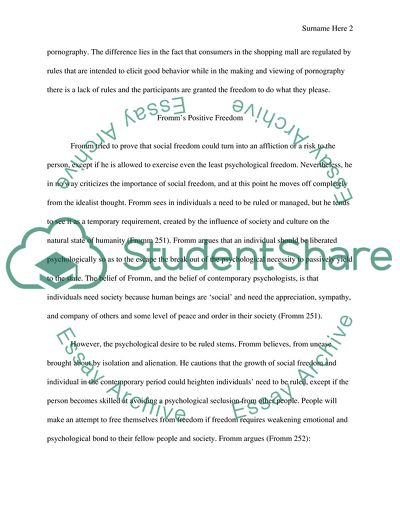Cite this document
(Exploring the Concept of Positive Freedom Research Paper, n.d.)
Exploring the Concept of Positive Freedom Research Paper. https://studentshare.org/psychology/1813558-what-does-fromm-mean-by-positive-freedom-and-discuss-what-sort-of-freedom-is-expressed-by-the-activity-of-the-consumer-in-the-shopping-mall-and-in-the-making-and-viewing-of-pornography
Exploring the Concept of Positive Freedom Research Paper. https://studentshare.org/psychology/1813558-what-does-fromm-mean-by-positive-freedom-and-discuss-what-sort-of-freedom-is-expressed-by-the-activity-of-the-consumer-in-the-shopping-mall-and-in-the-making-and-viewing-of-pornography
(Exploring the Concept of Positive Freedom Research Paper)
Exploring the Concept of Positive Freedom Research Paper. https://studentshare.org/psychology/1813558-what-does-fromm-mean-by-positive-freedom-and-discuss-what-sort-of-freedom-is-expressed-by-the-activity-of-the-consumer-in-the-shopping-mall-and-in-the-making-and-viewing-of-pornography.
Exploring the Concept of Positive Freedom Research Paper. https://studentshare.org/psychology/1813558-what-does-fromm-mean-by-positive-freedom-and-discuss-what-sort-of-freedom-is-expressed-by-the-activity-of-the-consumer-in-the-shopping-mall-and-in-the-making-and-viewing-of-pornography.
“Exploring the Concept of Positive Freedom Research Paper”. https://studentshare.org/psychology/1813558-what-does-fromm-mean-by-positive-freedom-and-discuss-what-sort-of-freedom-is-expressed-by-the-activity-of-the-consumer-in-the-shopping-mall-and-in-the-making-and-viewing-of-pornography.


